"It just doesn't seem real''
Matt and Jesica Beaty help their Tennessee home rebuild from a devastating tornado
.png)
By Jerry Crasnick

Dresden, Tenn., is a town of about 3,000 people tucked away in the northwest corner of the state. Jesica Parsley was born in Dresden and Matt Beaty moved there from Georgia as a teenager, and they’ve maintained their ties to the community while pursuing their life goals. She studied at Lipscomb University in Nashville and he went off to play ball at Belmont College -- also in Nashville -- and they got married in 2016. But even as he prepares for his fourth big-league season with the Los Angeles Dodgers, they remain a couple of small-town kids at heart.
So it was with a sense of empathy, trepidation and horror that they saw their childhood home leveled by the recent tornadoes that caused billions of dollars in damages and took dozens of lives Kentucky, Arkansas, Tennessee, Missouri, Mississippi and Illinois.
The Beatys, who live in Arizona in the offseason, had already established the Matt Beaty Fund to provide resources for student-athletes in Weakley County. Now they’re branching out with a greater sense of urgency, raising money to help family and friends in Dresden rebuild from the tornado damage.
They spoke to the MLBPA about the tornadoes, the resultant toll on their home, and their desire to get involved. The conversation has been edited for brevity and clarity.
You both have a personal connection to Dresden. What's your history there?
Jesica Beaty: I was born and raised there and went up through all of the school systems. My parents and my family are all still local. When I went to college in Nashville, that was the only time I ever knew anything other than Dresden. Baseball has taken us everywhere and we don't live in Dresden anymore, but that's what we call home and I think will always call home.
Matt Beaty: I moved there from Atlanta when I was in seventh grade. I was kind of an outsider, and they took me in like I was one of their own. My first week there, I was at football practice and all the guys were asking if Michael Vick was my favorite player and how many Falcons games I had been to. It was a smaller community and they think you're a big city slicker. But I just felt so at home right away when I moved there, and that's what the small-town community means to us.
What are your other childhood memories of Dresden?
Jesica: There's a McDonald's, a Subway and a Mexican restaurant, and if you want to sit down and eat you go to La Cabana for dinner. If I had a good game in basketball, I would go to QMart for chicken tenders and eat them right across the street from my old house. When you’re growing up, that’s all you know. The closest Walmart is 15 minutes away. And when we wanted to go shopping the day after Christmas, we would drive 45 minutes to Jackson or make the trip to Memphis and Nashville. The same hangout spots that my parents had, we had and my brother had. Everyone passes those things down in Dresden. That’s the whole small-town vibe of the town.
Matt: Anytime there's an event going on, the whole community knows about it. Football games. Basketball games. We went to state tournament a couple of times after we were out of school and everybody that had graduated in the last five or 10 years would be at those football games. So when people leave the community, they don't necessarily leave the community. You're still all tied together. You're still all family.




What went through your minds when you heard that Dresden was being hit by tornadoes?
Matt: We were at dinner with some friends, and we came back and Jes was like, ‘I think the storm hit Dresden.’ It was just a tornado watch, and we have those all the time. It’s not right in the middle of tornado alley, but it’s close enough where storms happen all the time. I remember growing up as a kid, and the old thing was that tornadoes always go north or south because Dresden is on a hill and it always misses. It’s coming right at you, and then it diverts the other way at the last second. So I was like, ‘It's probably just another scare.’
Jesica: When we were juniors, a tornado touched down in the Gleason area like two miles from the high school in the middle of a basketball game. It was halftime and they made everyone spread out across the school and get into the bathrooms. There were multiple times my mom would listen to the scanner in the middle of the night and wake us up and we had to go into the hallways. The house I grew up in didn't have a basement, and one time it got bad enough that we went across the street to our neighbor's house and hunkered down in their basement.
How did the day of the tornadoes unfold for you, and how did you get your information?
Jesica: I had been talking to my mom and texting her that day, and she asked me, ‘Have you seen the weather back here?’ And my first response was, ‘Oh, is it gonna snow?’ And she goes, ‘No, tornadoes, potentially starting at 9 p.m. all the way until 5 a.m.’
I got on Twitter and multiple accounts were saying a tornado had touched down on the ground and it was miles long, and I just looked at Matt. For over an hour there was nothing from my parents, my grandparents or my friends. My mom was the first one finally to text back and it was the green group message. And she was like, ‘We're OK.’ Then she sent another one that said, ‘Round one done.’ Then the third message was, ‘It's coming again.’
That was the scariest thing, being so far away and not being able to know what was going on or if everyone was OK. It’s such a small town, are there going to be enough resources to go and get people out if they’re trapped, especially with no phone communication? It stormed that night, but thank goodness there wasn’t another tornado that touched down.
What was your reaction when you saw the video and the photos of Dresden?
Matt: We really didn't see the damage until we woke up the next morning. And then you see the aftermath. That was the most devastating thing. The tornado’s track went through the most populated part of Dresden, so it hit the most houses and businesses straight through downtown. The courthouse is the only building that's really standing that doesn’t have significant damage. The pizza spot where we used to go: Gone. The city newspaper: Completely wiped out. All that’s sitting there is a desk one of the newspaper journalists used to work at. The buildings are gone. There's just rubble and trees everywhere.
Jesica's grandparents live about a quarter mile from where the tornado ripped through downtown. It's just a miracle that there were no lives lost. There were some injuries, but none of them seem to be life-threatening.
Jesica: We used to eat breakfast at a new place downtown. It’s no longer there. The big Methodist church downtown is halfway gone. And one of my best friends that I grew up with, their house is completely gone. My mom said, ‘I know you're seeing all these pictures, but it doesn't even do it justice.’
These are people that lost everything. I mean, businesses after businesses. Vaughan Brothers is another business there. They just supported our scholarship fund. And their sign was found in Murray, Ky., which is about 50 miles from Dresden. Seeing and hearing things like that, it just doesn’t feel real.

Photo courtesy of Twitter @branchman68

Photo courtesy of GEORGE WALKER IV / THE TENNESSEAN
Did your family leave during the tornado or did they stay?
Jesica: I'm pretty sure everyone in Dresden stayed home and rode it out. I pray to God nothing like this ever happens again. But if there were to be tornado warnings tonight, no one would leave and it would be the same thing. For better or worse. That's the kind of place it is. And because of that, that's why there were volunteers walking the streets the next day trying to figure out, ‘Where do we start? What do we do? Let's go. Let's get it done.’
What are you hearing from your friends and family involved in the cleanup?
Jesica: My dad has one of those Gator-like utility vehicles and they took it to my grandmother's house and started clearing her yard. Then they went around to a couple other houses on the street. I think the initial thought was, ‘We don’t have chainsaws and that type of stuff. But I do have this vehicle that we can load stuff on.’ The other big thing is just going around and making sure everyone is OK. Sitting at home with no electricity or a half -running generator isn't going to do any good. So you get out and try to help the best way you can.
Matt: It wasn’t just the emergency service people and the linemen. An hour after the storm was over, your normal citizens were going out and seeing if they could help people, or sharing stuff on Facebook. ‘Hey, I haven't been in contact with this person in the community. Can you go to their house and make sure everything's OK?’ Or, ‘There are power lines down in this area.’ Stuff like that. Just seeing the entire community come together was pretty cool to see.

Photo courtesy of radioNWTN

Photo courtesy of GEORGE WALKER IV / THE TENNESSEAN
Matt, as a major-league player, you have more visibility than most. How can that be useful at a time like this?
Matt: We wanted to open up this fund because people have so many needs right now. Supplies. Tarps. Clothing, There are Christmas presents that little kids have lost out on, I'm sure. But we also want to make sure they have what they need to build those businesses back up. And that's just part of the platform that I have. We've already had a Dodgers podcast, Dodgers Nation, make a generous donation to our fund. It’s so special to know we're able to have that outreach and people care enough to pour back in and help with something that matters so much to me.
This is more than just a short-term initiative, correct?
Jesica: We started the Matt Beaty Fund in 2019 to support the sports programs in Dresden and Weakley County, so I think it was meant to be that we've already established something like this. Even though we don't live there anymore, we will always be plugged into the community. Whatever help we receive from this, we want to do something very tangible. We have family and friends that are going to be living this in the days to come. However people want to help, it's going to go right back to the ground there.
Matt: We’re not just going to sit back and watch this disaster happen to the people there. We want to give back and help rebuild what we grew up with. We’re here to help. And we’re part of this community, too.
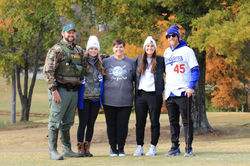 | 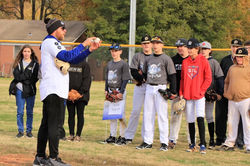 | 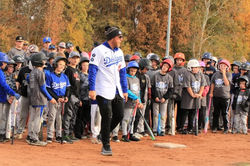 |
|---|---|---|
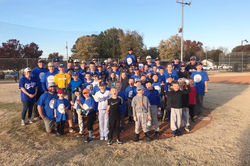 | 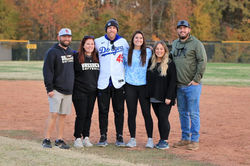 | 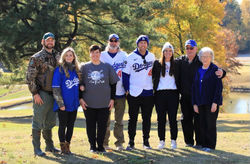 |
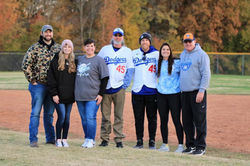 |
.png)